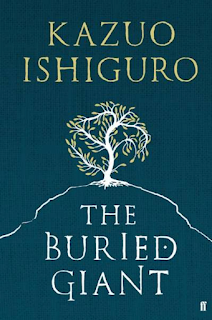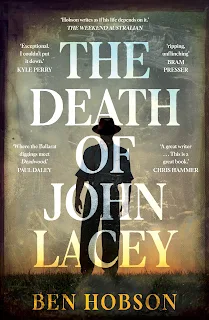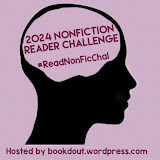The Ten Thousand Doors of January by Alix E. Harrow is a young adult urban fantasy novel about adventure, stories, portals, travel and change. I knew I was going to be in safe hands very early on when our narrator quotes her father on Page 2:
"If we address stories as archaeological sites, and dust through their layers with meticulous care, we find at some level there is always a doorway. A dividing point between here and there, us and them, mundane and magical. It is at the moments when the doors open, when things flow between worlds, that stories happen." Page 2
And that's precisely what happens here. Our narrator is young January Scaller and her life changes forever when she finds a door at the age of seven. January is a difficult child with an absent father, and was given a number of nursemaids, who soon quit their position. Here's a robust character description of a new nursemaid from our narrator:
"The newest one [nursemaid] was a German immigrant named Miss Wilda, who wore heavy black woolen gowns and an expression that said she hadn't seen much of the twentieth century yet but heartily disapproved of it thus far. She liked hymns and freshly folded laundry, and detested fuss, mess, and cheek. We were natural enemies." Page 16-17
Don't you just love that? I can picture Miss Wilda perfectly, and even more, I want to read about all the ways they disagreed. Growing up as the ward of Mr William Cornelius Locke - a self-made almost-billionaire and chairman of the New England Archaeological Society - January lives in a mansion full of antiques and rare collectibles, yet is restless. She doesn't interact with anyone her own age, with the occasional exception of Sam, the son of the local grocer.
"I used my most grown-up voice, as if I had never once chased him across the lawn howling for his surrender or fed him magic potions made of pine needles and lake water." Page 33
This is an historical fiction adventure story, and like many great adventure stories before it, there's a book and on finding it, the reader - along with January - is plunged into the story of young Adelaide:
"Standing beside her grandmother's deathbed, woolen dress still smelling of black logwood dye, Ade had felt the way a sapling might as it watched one of the old forest giants come crashing magnificently to rest: awed, and perhaps a little frightened. But when Mama Larson's final breath rattled from her ribs, Ade discovered the same thing the young sapling would have: in the absence of the old tree, there was a hole in the canopy above her." Pages 97-98
Early on it was difficult to separate the stories of Ade (Adelaide) and January in my mind, and the third person narration was briefly confusing, but thankfully it improved as the novel progressed. Harrow's exquisite writing more than compensated for the flow, and I marvelled at her ability to convey so much in just one sentence:
"She took another gulp from the brown glass bottle and muttered herself into silence, complaining about rich folk, young folk, nosy folk, Yankees, and foreigners." Page 338
The Ten Thousand Doors of January reminded me of
Strange the Dreamer by Laini Taylor a little, in the shared coming of age quest of sorts that leads to danger, adventure and eventually self discovery. The existence of portals that lead to other worlds isn't new in fiction, and I've enjoyed
The Chronicles of Narnia by CS Lewis,
The Starless Sea by Erin Morgenstern and more recently
Fairy Tale by Stephen King.
In this particular portal fantasy novel, the doors represent change and characters very quickly decide whether that change is good or not. The doors create an inevitable 'leakage between worlds' (the author's words, not mine) which includes people and objects travelling between them. My mind was racing at this point, imagining how this theory could apply to some of the mysteries in our own world as we know it. Perhaps the Voynich manuscript came from one of these worlds, who knows?
Naturally, this gives rise to themes of ethnicity and multiculturalism, as does the idea of preserving each world in its current state and slowing or preventing the use of doorways to freely travel. Younger readers will take this at face value, while mature readers will see how these attitudes and prejudices are reflected in our history and in our present.
I'll leave you with one last quote I hope you might like:
"Those of you who are more than casually familiar with books - those of you who spend your free afternoons in fusty bookshops, who offer furtive, kindly strokes along the spines of familiar titles - understand that page riffling is an essential element in the process of introducing oneself to a new book. .. It might smell expensive and well bound, or it might smell of tissue-thin paper and blurred two-color prints, or of fifty years unread in the home of a tobacco-smoking old man. Books can smell of cheap thrills or painstaking scholarship, of literary weight or unsolved mysteries.
This one smelled unlike any book I'd ever held. Cinnamon and coal smoke, catacombs and loam. Damp seaside evenings and sweat-slick noontimes beneath palm fronds. It smelled as if it had been in the mail for longer than any one parcel could be, circling the world for years and accumulating layers of smells like a tramp wearing too many clothes." Pages 22-23
I just love that quote! I recently learned that bildungsroman is a term used to describe a coming of age story; thanks to Sam for that little pearl. This book was a gift for Christmas and
The Ten Thousand Doors of January by Alix E. Harrow is a bildungsroman for those who prefer their reading material to be full of adventure and fantasy with a touch of historical fiction.
Highly recommended.







































